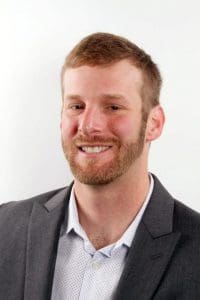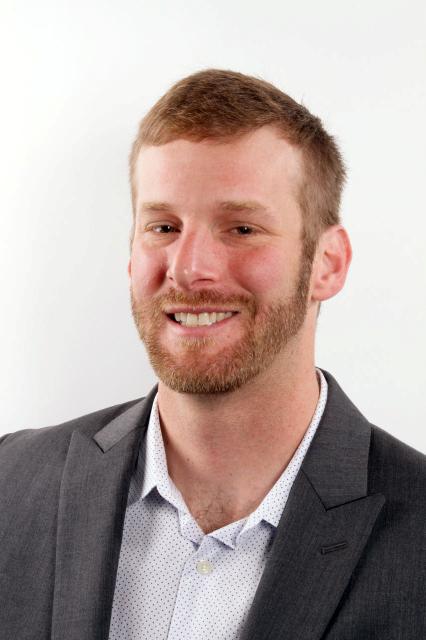
*This is the second article in our Q&A series with our current Student Representatives.
Scott Bright is a second-year student in the sustainable business management program at Presidio Graduate School and 2013-14 student representative.
Scott says he finds it hard not to get involved in a community that he’s passionate about.
“I like to connect with people and saw a lot of good opportunities here at PGS to grow as an individual and develop personally and professionally through clubs and leadership opportunities.”
We caught up with Scott for a brief conversation on what he’s seeing in the PGS community that energizes him most, what’s possible now that wasn’t possible before and what new conversation he believes needs to be had. This is an edited and condensed version of that conversation.
What energizes you the most about what you are seeing unfolding in the PGS community?
Scott: This is a young program and that comes with a set of unique challenges that any young school, business or organization would face.
But the community of students, teachers and, in many ways, the administration and faculty, is so dynamic and rich in a sense that it goes beyond any other community that I’ve been in. I find that most unique. There’s just a really strong bond within the community. You feel like you are part of something much larger than the pedigree of a 100-year-old school.
What’s possible now that wasn’t possible before?
Scott: That’s probably the easiest question for me to answer.
I’m in Atlanta right now doing a summer fellowship through the Environmental Defense Fund. It’s a program called Climate Corps. I’m working at CNN headquarters doing energy efficiency consulting and that was never even in my mind a year ago and I didn’t even think I would get this fellowship.
It’s been pretty amazing just to see how I’ve been able to (benefit) from this education.
Do you have a story that shows the best of what is happening right now at PGS?
Scott: There is a conference focused on sustainability for the most part called Net Impact that circulates around the country annually and this year it is taking place in California, relatively close to our school.
For the first time, universities are allowed to play a large role in terms of developing some of the content and PGS received three of eight tracks of material around which to develop the content.
So PGS is playing a significant role as a university in probably the biggest conference in the U.S. on sustainability.
That project was largely student-driven, with a couple of students in particular working really hard to fill in applications.
(All this) says a lot about the passion and enthusiasm and work ethic of people at our school, and also that we are a leader in terms of sustainability education.
What conversation, if begun today, could ripple out in a way that created new possibilities for the future of this community?
Scott: PGS is definitely at a point where it either needs to stay as a specialized school or figure out a way to appeal to a larger market.
So the conversation that needs to be had is whether we should pigeon ourselves as a specialized school and see ourselves as a specialized group of students in grad school, or if we’re just studying generalized business or public administration.
A lot of times I get asked what school I go to, and I explain it’s a specialized graduate school focused on sustainable business management. And it would be nice to just say that it’s an MBA program for the future, or a business school that’s really focused on the future of business — just a different way of thinking about it, rather than just being specialized.
What challenges might come up and how could these be met?
Scott: There is definitely a whole ton of challenges in that. Sustainability in and of itself is in a lot of ways a conversation because it’s a way to do business, it’s a lifestyle choice, it’s a way to invest, to select food or purchase.
So a lot of it is a conversation.
It’s also deeply rooted in politics in this country right now, and that’s definitely the challenge. There is some polarity around it and not everyone believes in it because it’s so linked to certain issues that are hot topics, rather than just being considered a cost-saving measure or a way to produce less waste.
I think we just need to stop calling ourselves specialized and say that we do business education and go out and compete with other business students and actually outperform them, perhaps, in business cases or, for example, in this fellowship that I’m doing now, where I was up against other MBA students. I happened to know more about the material because I study energy efficiency in school and they don’t.
The education here is addressing challenges that are more relevant today than maybe traditional MBA programs are addressing.
Certain elements within sustainability are essential for business success, for any sort of future development in my mind, and that (perspective), rather than just a club at a university, should be embedded into business and business education as a whole.
How do you anticipate being involved in that conversation?
Scott: I am involved by choosing to go PGS; I’m involved by doing this fellowship in Atlanta and working in a place that focuses on topics a lot of people don’t understand, but you have to find a way to relate to people and just being active and passionate and determined but not attached to an outcome is a great way to start.
I think PGS is really focused on not just sustainability but teaching students to become leaders and great communicators, and fundamentally how you lead any conversation to facilitate long-term change.

